
95% of researchers rate our articles as excellent or good
Learn more about the work of our research integrity team to safeguard the quality of each article we publish.
Find out more
ORIGINAL RESEARCH article
Front. Educ. , 13 November 2024
Sec. Higher Education
Volume 9 - 2024 | https://doi.org/10.3389/feduc.2024.1483003
This article is part of the Research Topic Empowerment Through Education Innovative Interventions for Higher Education Students View all 13 articles
Scientific research training (SRT) is crucial for fostering skills and innovation in college students. However, the status of SRT in medical undergraduates and postgraduates, as well as the impact of early SRT on students’ innovation abilities, remain largely unknown. This study assessed the role of SRT in culturing innovation abilities among medical students. The results revealed that undergraduates exhibited a greater understanding of scientific research compared to postgraduates. Notably, undergraduates demonstrated a higher level of understanding of SRT in contrast to postgraduates (81.26% vs. 56.97%). A significant proportion (>70%) of undergraduates had engaged in research activities early in their academic journey, with an average participation duration exceeding 1 year. Moreover, undergraduates initiated their involvement in SRT during the first- and second- year of undergraduates, which was earlier than postgraduates. Personal interest emerged as a primary motivator for engaging in SRT, with postgraduates exhibiting higher research aspirations and achieving greater research outcomes. Postgraduates also received more substantial guidance from advisors, leading to enhanced academic performance compared to undergraduates (90.7% vs. 67.59%). Interestingly, students expressed satisfaction with laboratory conditions and attributed their academic success to personal efforts. These findings underscore the importance of early SRT in cultivating the innovation abilities of medical students.
The 5-year medical bachelor’s degree program is a fundamental component of the medical education system in China (Liu et al., 2023), aimed at training qualified practicing physicians through a curriculum comprising basic and clinical medicine courses as well as internships. Upon completion, graduates are eligible to undertake the National Medical Licensing Examination (NMLE) following a year of clinical work at medical institutions. Subsequently, these students are required to undergo 3 years of standardized residency training before being recognized as doctors. However, it is noted that this program in China lacks emphasis on scientific research training (SRT). In contrast, in other developing countries, while SRT during medical education remains less prevalent than desired, student interest in research activities is generally high (de Oliveira et al., 2011). The SRT program is designed to encourage undergraduate students to carry out innovative research, facilitated by the mentorship of supervisors. Students will engage in the processes of design, preparation, implementation of a research project, and eventually exchange of research findings or outputs (Zhang et al., 2017). This initiative strongly advocates for multidisciplinary research and collaboration across various departments. Research awards for graduate students offer a platform for honing research and methodological skills, fostering student-centred outcomes, and enhancing their confidence in research endeavors (Cepanec et al., 2016). The establishment of an integrated international program encompassing clinical, basic, and methodological training enables medical students to gain insights into variations in healthcare and medical education practices across different countries (Elharram et al., 2018). SRT in basic and clinical medical sciences is pivotal in enhancing clinical skills and fostering innovation capabilities, thereby underscoring the importance of training a cadre of highly skilled clinicians equipped with knowledge, skills, and innovation acumen to enhance healthcare services.
In a manner akin to clinical research practices observed in various other nations, an increasing number of Chinese clinicians are actively participating in scientific research endeavors alongside their clinical responsibilities (Luft, 2016). Nevertheless, a significant proportion of Chinese clinicians did not undergo comprehensive systematic scientific research training during their medical education (Liu et al., 2023). This underscores the pressing necessity to enhance the innovative capacities of clinician scientists. Reinvigorating the concept of the clinician–scientist-teacher archetype could potentially facilitate the cultivation of upcoming generations of translational researchers (DeLuca et al., 2016). To address the disparity in innovation capabilities between clinicians and scientists, it is imperative to establish linkages between fundamental research and translational medicine for medical students (Niessen and Krieg, 2014). SRT has emerged as a prominent educational program aimed at enhancing the innovation skills of medical students (Fang and Meyer, 2003; Li et al., 2018). Noteworthy outcomes, including academic publications, inventions, patents, and clinical applications, have been realized since the inception of SRT. Early implementation of SRT has been integrated into the curriculum at Ningbo University Health Science Centre since 2010 as a key strategy for fostering innovation among medical students. However, the precise correlation between early exposure to SRT and the innovation aptitude of medical students remains to be elucidated.
The primary objectives of this research are to investigate the status of SRT among undergraduate and postgraduate students at Ningbo University, and to examine the correlation between early exposure to SRT and innovation capabilities in medical students. A comprehensive and dependable questionnaire survey was carried out to gather pertinent data. Upon scrutinizing the acquired information, it was observed that undergraduates exhibited a greater comprehension of research compared to postgraduates. Furthermore, undergraduates engaged in research activities at an earlier stage in their academic journey than postgraduates. The majority of postgraduates harbored more ambitious research aspirations than undergraduates, and having specific research objectives was associated with greater academic achievements. Regular guidance was found to be beneficial in enhancing students’ academic performance, with personal effort emerging as a key determinant of academic success and subsequent innovation potential. These results underscore the broader integration of SRT within medical education, suggesting that the effective implementation of SRT in nurturing medical students could serve as a cornerstone for cultivating future cohorts of clinician scientists.
A cross-sectional, descriptive investigation was carried out to assess the scientific research and innovation capabilities of medical students. The study involved surveying both undergraduate students (n = 108) and postgraduate students (n = 86) at Ningbo University Health Science Centre between December 2022 and January 2023. Ethical approval for this study was obtained from the institutional review board at Ningbo University Health Science Centre under the reference number NBU-20221205.
Two distinct sets of questionnaires were developed for undergraduate and postgraduate students, as detailed in the Supplementary material. The primary inquiries of the questionnaires included various questions, such as the basic information of the participants, the comprehension of SRT, the involvement in SRT activities, the drivers and influences behind research engagement, the guidance received from advisors in SRT, the academic achievements related to SRT, the evaluation of research environments, the satisfaction on the SRT experience, and the recommendations for enhancing the SRT experience. The reliability of these questionnaires were analyzed by Cronbach’s alpha model.
The research team at Ningbo University Health Science Centre administered a questionnaire survey to assess the scientific research and innovation capabilities of students. Invitations containing a link to the survey were randomly sent via WeChat to undergraduate students ranging from first-year to fifth-year, as well as to postgraduate students from first-year to third-year. Non-respondents were sent up to three additional follow-up WeChat invitations.
The outcomes of the survey were automatically documented using the online WeChat questionnaire survey system. Subsequent to the designated deadline, the raw data was retrieved from the system and valid data was manually gathered. The integrity, precision, and uniformity of the gathered data were verified by three distinct independent examiners.
The descriptive statistics were employed to delineate responses across all inquiries, with data analyses conducted utilizing Microsoft Excel software. The reliability analysis of the questionnaires was performed with Cronbach’s alpha model by using SPSS 13.0 software. A Cronbach’s alpha value above 0.7 suggests acceptable reliability.
To assess the level of understanding of scientific research among medical students, we conducted the questionnaire survey at Ningbo University. The alpha values for undergraduate and postgraduate questionnaires are 0.812 and 0.775, respectively, indicating acceptable reliability. The survey focused on evaluating scientific research and innovation skills. The study included 108 undergraduate students and 86 postgraduate students as valid respondents post random invitations. The results revealed that 9.26% of undergraduates exhibited a high level of understanding in research, while 75% of undergraduates demonstrated familiarity with research concepts (Figure 1A). In contrast, only 1.16% of postgraduates displayed a strong understanding of research, with 55.81% of postgraduates indicating some level of knowledge in research (Figure 1B). Consequently, the research comprehension among undergraduates was notably higher compared to postgraduates (81.26% vs. 56.97%). Furthermore, a significant proportion of both undergraduate (88.89%) and postgraduate (90.69%) participants expressed interest in research (Figures 1C, D). Notably, a majority of undergraduates (80.56%) acknowledged the benefits of research for their professional development (Figure 1E). Similarly, 84.26% of undergraduates recognized the advantages of early exposure to scientific training in enhancing their academic skills (Figure 1F). Among undergraduates, the most essential skills identified were reading literature, followed by problem analysis and solving abilities (Figure 1G). These findings suggest that undergraduates exhibit a higher level of understanding in the realm of scientific research.
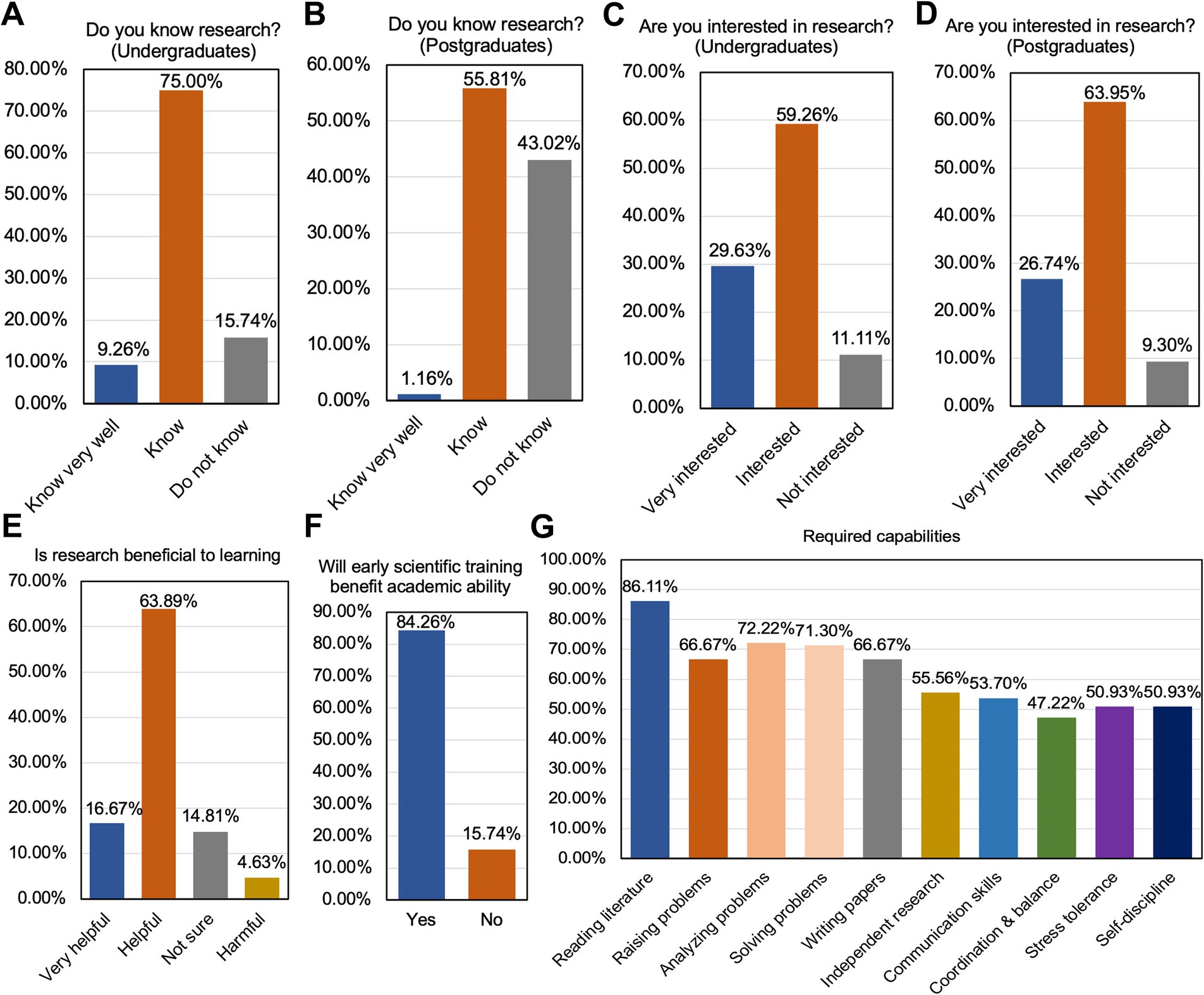
Figure 1. Comprehension of research among medical undergraduates and postgraduates. This includes an exploration of the understanding of research among medical undergraduates (A) and postgraduates (B), as well as an investigation into the level of interest in research among medical undergraduates (C) and postgraduates (D). Additionally, the potential benefits of research on the learning process of medical undergraduates (E), the impact of early scientific training on academic performance among medical undergraduates (F), and the essential skills and competencies necessary for research among medical undergraduates (G) are analyzed.
To further explore the impact of stated interests and requirements on individuals’ behaviors, an analysis was conducted on their research backgrounds. Among the eligible postgraduate participants, 31.4% indicated having engaged in research activities during their undergraduate studies (Figure 2A). A majority of postgraduates (59.3%) commenced their research endeavors during the initial year of their postgraduate program (Figure 2B). In contrast, for undergraduates, 48.15% of first-year students and 21.3% of second-year students were involved in research activities (Figure 2C). Notably, 52.78% of undergraduates engaged in research through programs like the Student Research Training Program (SRTP), while 37.04% participated in research competitions such as the “Challenge Cup” competition in basic medical sciences and clinical medicine (Figure 2D). Regarding the funding sources for their research projects, 34.26% were advisor-funded, 27.78% were advisor-consulted, and a minimal proportion (5.56%) were self-initiated (Figure 2E). Furthermore, nearly one-third of undergraduates had accumulated over 12 months of research experience (Figure 2F). Collectively, over 70% of undergraduates had engaged in research activities during their early academic years, with an average research participation duration exceeding 1 year.
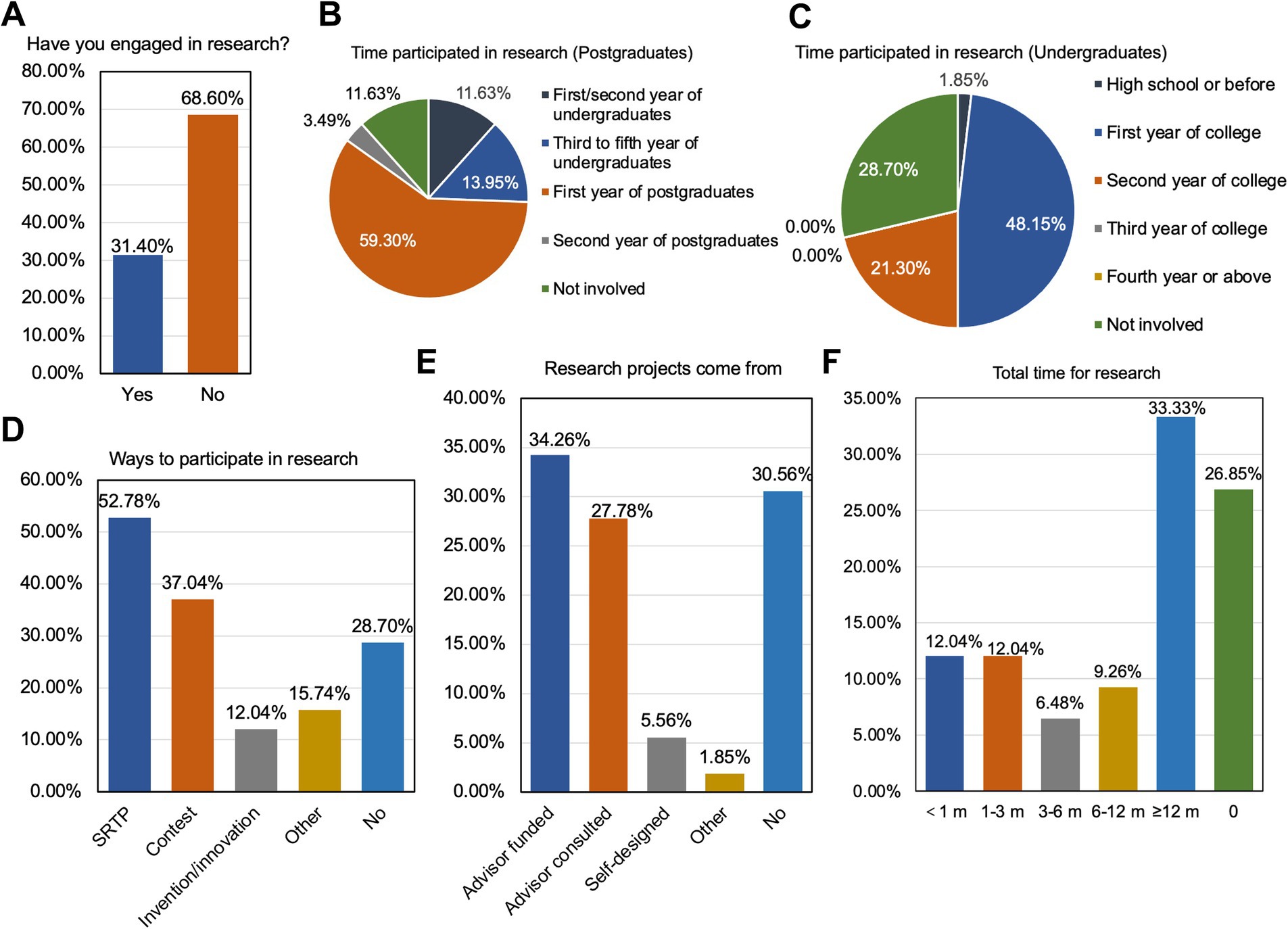
Figure 2. Involvement of medical students in research activities. It includes data on various aspects such as (A) whether to engage in research, (B) time participated in research in postgraduates, (C) time participated in research in undergraduates, (D) the ways to participate in research in medical undergraduates. SRTP, scientific research training program, (E) the sources of research projects in medical undergraduates, and (F) total time for research in medical undergraduates.
The primary driving force for undergraduate involvement in research was found to be personal interest, innovation credit, awards/honors, graduate entrance and others (Figure 3A). A significant proportion of undergraduates (39.81%) demonstrated purposeful engagement, while 35.19% did not have specific goals (Figure 3B). In contrast, a higher percentage of postgraduates (47.67%) exhibited purposeful intent, with 41.86% lacking specific goals (Figure 3C). Analysis of research outcomes revealed that the top three benefits for undergraduates were increased awareness of medicine (63.89%), enhanced independence of research (59.26%), and recognition of personal limitations (50.93%) (Figure 3D). Postgraduates reported similar gains when surveyed (Figure 3E), with only a small minority of undergraduates (2.78%) and postgraduates (5.81%) indicating no benefits from their research endeavors (Figures 3D,E). These findings underscore the significance of personal interest as a primary motivator for research engagement, while also highlighting the higher research aspirations and gains among postgraduates compared to undergraduates.
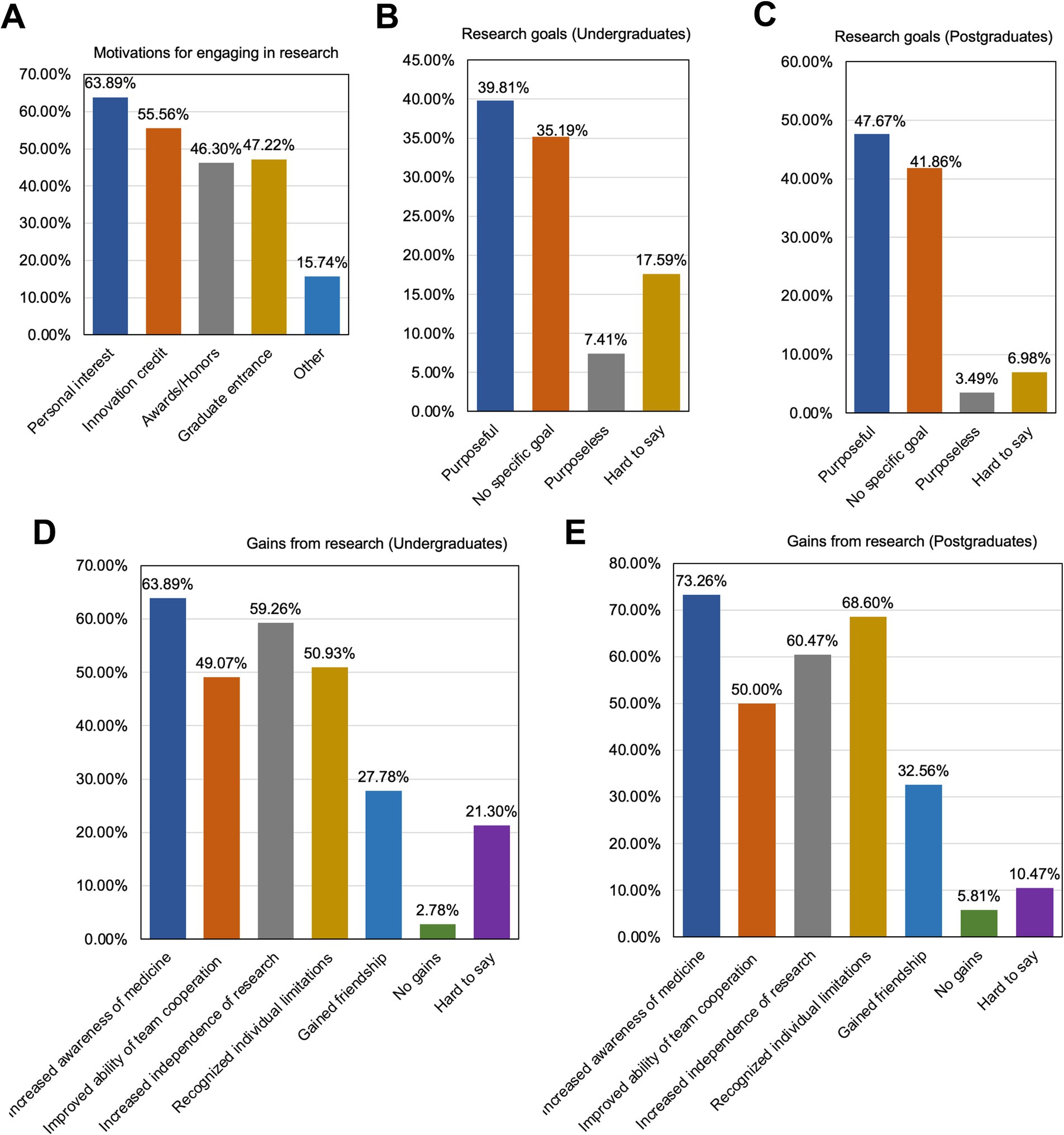
Figure 3. Motivations, goals, and gains associated with research endeavors. It delineates (A) motivations for engaging in research, research goals in medical undergraduates (B) and postgraduates (C), and gains from research in medical undergraduates (D) and postgraduates (E).
The study examined the correlation between academic advisors’ guidance and students’ academic achievements. The findings indicated that a majority of undergraduate students received frequent and consistent guidance from their advisors (Figure 4A), while postgraduate students received a greater proportion of guidance (Figure 4B). In line with this, a mere 2.78% of undergraduates obtained first author-papers/patents/awards (Figure 4C), whereas 15.12% of undergraduates achieved first authorship in academic performance (Figure 4D). Despite a similar percentage of undergraduates (12.97%) and postgraduates (12.63%) working toward first or non-first author academic performance, postgraduates demonstrated a higher rate of first author academic achievements compared to undergraduates (15.12% vs. 2.78%, Figures 4C,D). These results suggest that postgraduates benefited from a higher level of guidance, leading to enhanced academic performance.
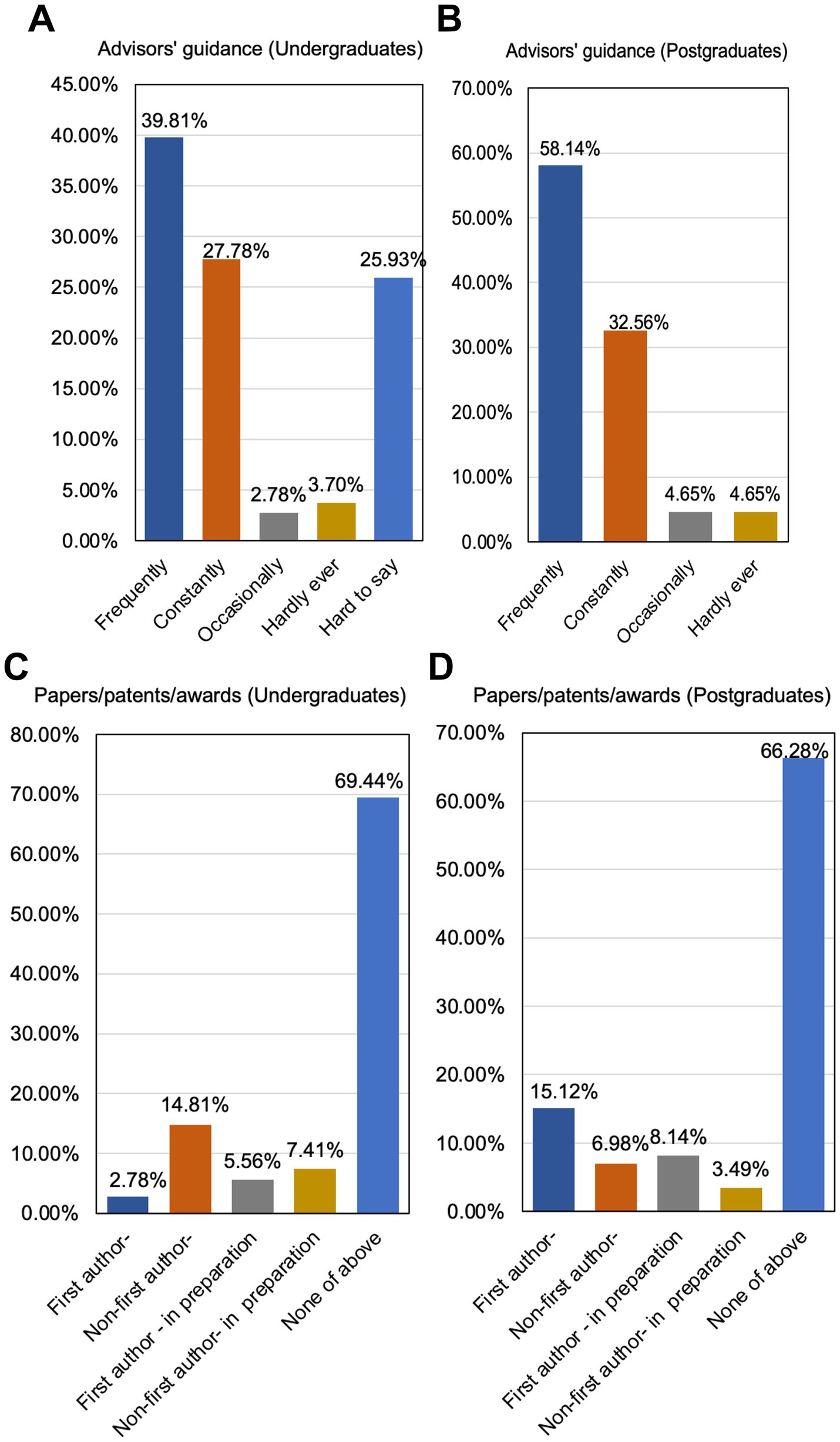
Figure 4. Correlation between advisors’ guidance and students’ academic performance. Advisors’ guidance in medical undergraduates (A) and postgraduates (B). Academic performance (papers/patents/awards etc.) in medical undergraduates (C) and postgraduates (D).
To further examine the various factors influencing academic performance, a survey was conducted to analyze and compare factors such as advisor’s ability, lab conditions, and personal efforts. The findings revealed that a majority of students (53.49%) identified personal efforts as the most crucial factor impacting academic achievement (Figure 5A). Subsequently, advisor’s ability emerged as the next significant determinant of academic performance. Among the valid responses, 67.44 and 26.74% of participants rated their advisors’ abilities as “High” and “Medium,” respectively (Figure 5B). The quality of research equipment and cultural surroundings were identified as pivotal aspects for academic pursuits. The results demonstrated that both undergraduate and postgraduate students expressed high levels of satisfaction with the available research equipment. A negligible percentage of undergraduates (4.63%) and postgraduates (5.81%) perceived the research hardware as inadequate (Figures 5C,D). Notably, both undergraduate and postgraduate students exhibited greater contentment with the cultural environment compared to the research hardware (Figures 5E,F). These outcomes suggest that the majority of students were content with the laboratory conditions and acknowledged the significance of personal efforts in achieving academic excellence.
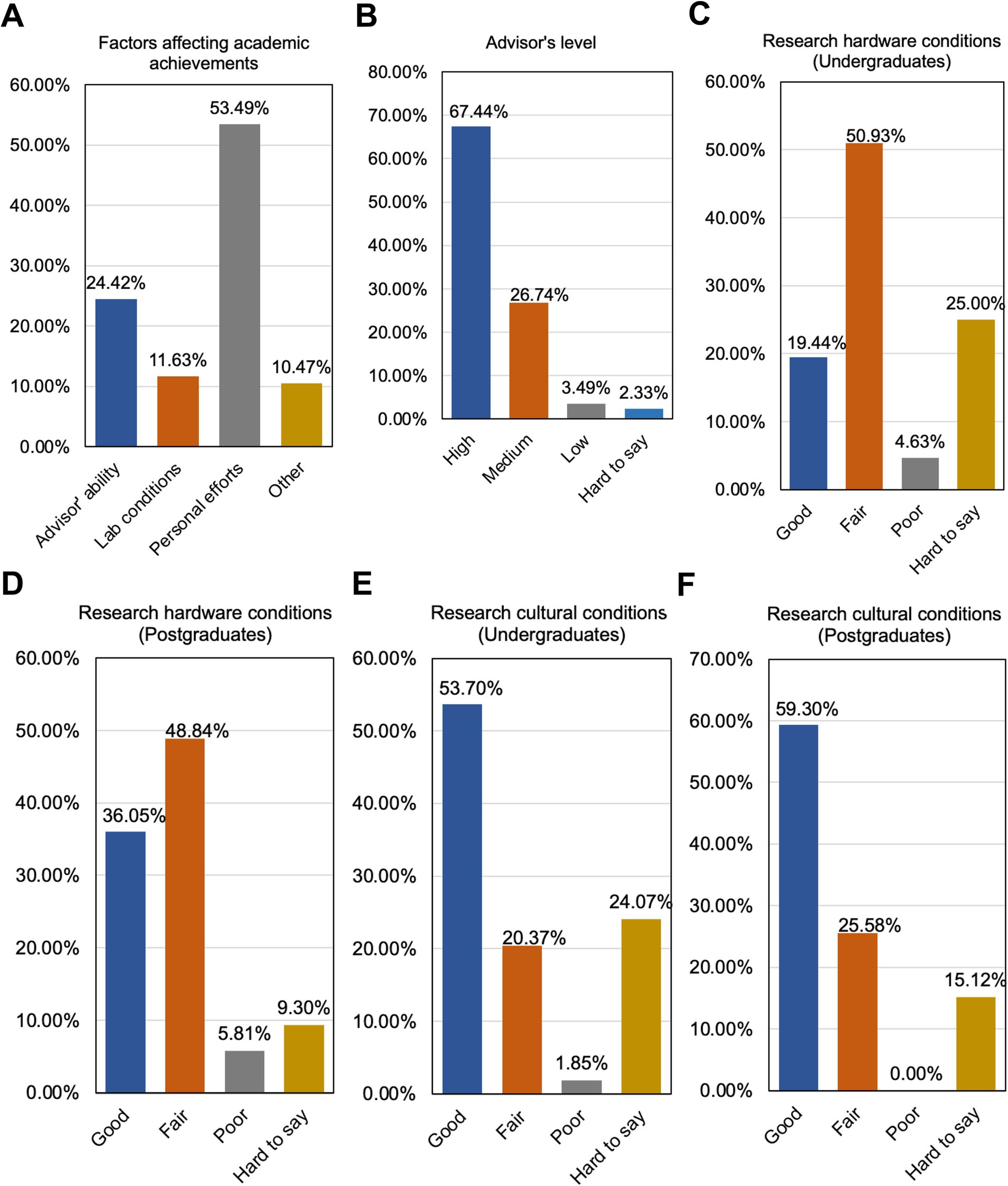
Figure 5. The subjective assessment of research experience. It encompasses various aspects such as (A) factors affecting academic achievements, (B) advisor’s level, research hardware conditions in medical undergraduates (C) and postgraduates (D), and research cultural conditions in medical undergraduates (E) and postgraduates (F).
Previous research demonstrated that the implementation of an early SRT program had positive effects on the academic and non-academic accomplishments of undergraduate medical students (Zhang et al., 2022). However, it is important to note that the structure and requirements of postgraduate and undergraduate programs within the Chinese medical education system differ significantly. Consequently, the impact of early SRT on the innovation capabilities of both undergraduate and postgraduate medical students remains uncertain. This study aimed to investigate the prevalence of SRT participation among undergraduates and postgraduates, as well as to examine the correlation between early SRT involvement and innovation skills in medical students. The findings revealed that undergraduate students engaged in research activities at an earlier stage compared to their postgraduate counterparts (Figures 2B,C). Moreover, it was observed that receiving more frequent guidance positively influenced students’ academic performance, with personal effort emerging as a key determinant of academic success and subsequent innovation potential (Figures 4, 5).
Medical research holds significant importance for clinician scientists. The incorporation of scientific research into medical education has been shown to enhance skills relevant to future clinical practice. The primary approach to teaching medical research to students has involved implementing basic research skills curricula and encouraging the longitudinal application of these skills (Lee et al., 2021). However, in China, there has been a lack of integration of professional curricula with medical research for undergraduate students. Despite their strong interest and motivation, only a small number of undergraduates have engaged in research activities (Chen et al., 2023; Zhang et al., 2022). The majority of Chinese medical undergraduates have participated in scientific research through the SRT program. Since its inception at Tsinghua University in 1996, the SRT program has become a key method for college students to enhance their skills and foster innovation. Consequently, the implementation of a structured SRT program has led to significant improvements in both academic and non-academic performance among medical undergraduates (Zhang et al., 2022; Zhang et al., 2017), highlighting the crucial role of early research training in enhancing the scientific performance and innovation capabilities of students. Notably, a cost-effective, peer-taught virtual research workshop has been established as a sustainable solution to enhancing the student research-related knowledge and skills (Martins et al., 2021; Ukrani et al., 2021).
Unlike undergraduates, Chinese medical postgraduates tend to engage in scientific research more spontaneously. The pursuit of a Master of Medicine typically necessitates postgraduates to conduct research and publish scientific papers (Liu et al., 2023; The Lancet, 2017). While our research indicated that undergraduates exhibited a greater understanding of research compared to postgraduates, the latter group demonstrated higher aspirations in research endeavors (Figure 3). These specific objectives were associated with enhanced academic performance and aligned with degree requirements. In an effort to enhance the research capabilities of postgraduates, a research training award program was introduced for graduate students. This initiative aimed to offer a research-intensive experiential learning opportunity to aid in the development of postgraduates as clinician scientists. The research training awards enabled postgraduates to cultivate research skills and achieve student-centered outcomes (Cepanec et al., 2016). Our findings demonstrated that postgraduates received a greater amount of guidance, which correlated with improved academic performance (Figure 4). Similarly, the frequency and methods of guidance were identified as independent factors influencing the perspectives of Chinese 8-year medical students regarding scientific research (Liao et al., 2022). The implementation of the research training program not only enhanced the research capabilities of postgraduates as clinician scientists but also bolstered their confidence in research endeavors.
The study on the enduring impacts of extracurricular scientific research involvement among undergraduate students revealed that such participation led to the development of scientific thinking skills and improvement in communication abilities. Furthermore, medical students were inclined to pursue postgraduate studies in order to further engage in scientific research endeavors (Wang et al., 2021). Our findings indicated that over 70% of undergraduates had engaged in research activities during their early academic years, with an average duration of participation exceeding one year (Figure 2). Various strategies have been implemented in medical education processes to enhance educational quality (Brown et al., 2018; Shen et al., 2016). The implementation of a structured SRT program was found to not only enhance research productivity among medical students but also bolster their research skills and motivation to pursue research endeavors (Liu et al., 2024; Zhang et al., 2022). Collaborative international training programs were also found to significantly impact the research capabilities of medical students (Rezhake et al., 2018). Therefore, the development of a well-structured SRT program is crucial for fostering innovation among medical students. Our results revealed that the majority of research projects were funded and guided by advisors, with only a small number being self-initiated by students (Figure 2). This underscores the importance of advisor guidance in academic performance, as postgraduates who received a higher level of guidance demonstrated superior academic achievements.
The reasons behind participation in clinical research were often associated with various advantages (Nappo et al., 2013). In a study conducted at Ningbo University, medical students indicated that their primary motivation for engaging in research was their personal interest. This primary incentive led to heightened awareness of medicine, increased independence in research, and acknowledgment of individual limitations (Figure 3). While the significance of research environments in yielding research outcomes is widely recognized (Jorgensen and Hanssen, 2018), our results demonstrated that personal effort emerged as the most crucial factor influencing academic accomplishments. Research has shown that the undergraduate research experience significantly impacts students’ inclination toward pursuing a career in science post-graduation (Linn et al., 2015). For medical students, involvement in research was connected to enhanced academic performance, increased knowledge, and strategic personal development (Amgad et al., 2015).
Our work revealed that undergraduate students exhibited a greater comprehension of research compared to postgraduate students, and involvement in research activities commenced at an earlier stage for undergraduates than for postgraduates. While postgraduates demonstrated higher aspirations in research than undergraduates, these targeted objectives were associated with significantly enhanced academic achievements. Consequently, these outcomes suggest a strong correlation between early research engagement and the innovative capacity of medical students. Therefore, the establishment of an early SRT initiative is imperative to cultivate a larger cohort of future clinician scientists and enhance the overall standard of medical education.
The original contributions presented in the study are included in the article/Supplementary material, further inquiries can be directed to the corresponding author/s.
The studies involving humans were approved by the Ethical Review Board of Ningbo University Health Science Centre. The studies were conducted in accordance with the local legislation and institutional requirements. Written informed consent for participation in this study was provided by the participants’ legal guardians/next of kin.
BW: Data curation, Formal analysis, Investigation, Methodology, Writing – original draft. LY: Data curation, Investigation, Methodology, Writing – original draft. ZG: Conceptualization, Data curation, Formal analysis, Funding acquisition, Supervision, Writing – review & editing.
The author(s) declare that financial support was received for the research, authorship, and/or publication of this article. The work was supported by the “14th Five-Year Plan” Teaching Reform Project of General Undergraduate Universities in Zhejiang Province (No. jg20220176), and the K.C. Wong Magna Fund at Ningbo University.
The authors appreciate medical undergraduates and postgraduates at Ningbo University Health Science Centre for their participating in surveys and feedback sessions, Min Zhang, student counsellor at Ningbo University Health Science Centre, for her assisting in questionnaire survey.
The authors declare that the research was conducted in the absence of any commercial or financial relationships that could be construed as a potential conflict of interest.
All claims expressed in this article are solely those of the authors and do not necessarily represent those of their affiliated organizations, or those of the publisher, the editors and the reviewers. Any product that may be evaluated in this article, or claim that may be made by its manufacturer, is not guaranteed or endorsed by the publisher.
The Supplementary material for this article can be found online at: https://www.frontiersin.org/articles/10.3389/feduc.2024.1483003/full#supplementary-material
Amgad, M., Tsui, M. M. K., Liptrott, S. J., and Shash, E. (2015). Medical student research: an integrated mixed-methods systematic review and meta-analysis. PLoS One 10:e0127470. doi: 10.1371/journal.pone.0127470
Brown, A., Nidumolu, A., Stanhope, A., Koh, J., Greenway, M., and Grierson, L. (2018). Can first-year medical students acquire quality improvement knowledge prior to substantial clinical exposure? A mixed-methods evaluation of a pre-clerkship curriculum that uses education as the context for learning. BMJ Qual. Saf. 27, 576–582. doi: 10.1136/bmjqs-2017-007566
Cepanec, D., Humphries, A., Rieger, K. L., Marshall, S., Londono, Y., and Clarke, D. (2016). Building graduate student capacity as future researchers through a research and training award program. J. Nurs. Educ. 55, 284–287. doi: 10.3928/01484834-20160414-08
Chen, H., Teng, T., Chen, H., Liu, X., Liu, Z., Li, X., et al. (2023). Motivation, self-efficacy, perception, curiosity, and barriers toward medical research among undergraduates in China. Biochem. Mol. Biol. Educ. 51, 18–28. doi: 10.1002/bmb.21684
de Oliveira, N. A., Luz, M. R., Saraiva, R. M., and Alves, L. A. (2011). Student views of research training programmes in medical schools. Med. Educ. 45, 748–755. doi: 10.1111/j.1365-2923.2011.03986.x
DeLuca, G. C., Ovseiko, P. V., and Buchan, A. M. (2016). Personalized medical education: reappraising clinician-scientist training. Sci. Transl. Med. 8:321fs2. doi: 10.1126/scitranslmed.aad0689
Elharram, M., Dinh, T., Lalande, A., Ge, S., Gao, S., and Noel, G. (2018). Global health values of a multidirectional near peer training program in surgery, pathology, anatomy, research methodology, and medical education for haitian, rwandan, and Canadian medical students. Ann. Glob. Health 83, 274–280. doi: 10.1016/j.aogh.2017.04.003
Fang, D., and Meyer, R. E. (2003). Effect of two Howard Hughes medical institute research training programs for medical students on the likelihood of pursuing research careers. Acad. Med. 78, 1271–1280. doi: 10.1097/00001888-200312000-00017
Jorgensen, F., and Hanssen, T. E. S. (2018). Research incentives and research output. High. Educ. 76, 1029–1049. doi: 10.1007/s10734-018-0238-1
Lee, G. S. J., Chin, Y. H., Jiang, A. A., Mg, C. H., Nistala, K. R. Y., Iyer, S. G., et al. (2021). Teaching medical research to medical students: a systematic review. Med. Sci. Educ. 31, 945–962. doi: 10.1007/s40670-020-01183-w
Li, X. F., Chen, X. J., Li, H. Q., Chen, L. N., and Xu, X. J. (2018). Application research of program management in medical students' emergency ability training. Basic. Clin. Pharmacol. 123:21. doi: 10.1111/bcpt.13159
Liao, Y., Zhou, H., Wang, F., Zhao, M., Wu, J., and Rong, P. (2022). The impact of undergraduate tutor system in chinese 8-year medical students in scientific research. Front. Med. 9:854132. doi: 10.3389/fmed.2022.854132
Linn, M. C., Palmer, E., Baranger, A., Gerard, E., and Stone, E. (2015). Undergraduate research experiences: impacts and opportunities. Science 347:1261757. doi: 10.1126/science.1261757
Liu, X., Chen, H., Liu, X., Teng, T., Li, X., Zhu, D., et al. (2024). Assessment of early scientific research skills training for medical undergraduates in China. Biochem. Mol. Biol. Educ. 52, 210–219. doi: 10.1002/bmb.21806
Liu, X., Feng, J., Liu, C., Chu, R., Lv, M., Zhong, N., et al. (2023). Medical education systems in China: development, status, and evaluation. Acad. Med. 98, 43–49. doi: 10.1097/ACM.0000000000004919
Luft, F. C. (2016). A visionary scientist selects clinicians for clinical research. J. Mol. Med. 94, 371–372. doi: 10.1007/s00109-016-1411-6
Martins, R. S., Ukrani, R. D., Raza Raja, M. H., Khan, M., Iftikhar, H., Fatima, S. S., et al. (2021). Peer-taught virtual research workshops for surgical residents: protocol for a novel and sustainable solution to improving surgical research in Pakistan. J. Pak. Med. Assoc. 71, S130–S135.
Nappo, S. A., Iafrate, G. B., and Sanchez, Z. M. (2013). Motives for participating in a clinical research trial: a pilot study in Brazil. BMC Public Health 13:19. doi: 10.1186/1471-2458-13-19
Niessen, C. M., and Krieg, T. (2014). Clinician scientists and Phds: the need to connect basic research to translational medicine - a personal experience. J. Invest. Dermatol. 134, 295–298. doi: 10.1038/jid.2013.466
Rezhake, R., Hu, S. Y., Zhao, Y. Q., Zhang, L., Zhao, X. L., Dominguez, A. Z., et al. (2018). Impact of international collaborative training programs on medical students' research ability. J. Cancer Educ. 33, 511–516. doi: 10.1007/s13187-016-1134-y
Shen, B., Dumenco, L., Dollase, R., and George, P. (2016). The importance of quality improvement education for medical students. Med. Educ. 50, 567–568. doi: 10.1111/medu.13039
The Lancet (2017). Medical education reform in China. Lancet 390:334. doi: 10.1016/S0140-6736(17)31921-9
Ukrani, R. D., Shaikh, A. N., Martins, R. S., Fatima, S. S., Naseem, H. A., and Baig, M. A. (2021). Low-cost peer-taught virtual research workshops for medical students in Pakistan: a creative, scalable, and sustainable solution for student research. BMC Med. Educ. 21:557. doi: 10.1186/s12909-021-02996-y
Wang, G., Ma, X. Y., Cheng, X., Luo, C. H., Wang, H., Xu, X., et al. (2021). The effects of long-term extracurricular scientific research on the medical students: insight from jinan university medical school. Biochem. Mol. Biol. Educ. 49, 535–545. doi: 10.1002/bmb.21499
Zhang, L., Yu, J., Peng, X., and Gong, Z. (2022). The impact of a planned strategy of early scientific research training on medical students’ research productivity. Eur. J. Educ. Pedag. 3, 183–189. doi: 10.24018/ejedu.2022.3.2.332
Keywords: scientific research training, medical students, innovation ability, medical education, undergraduate, postgraduate
Citation: Wang B, Yang L and Gong Z (2024) Early scientific research training links to the innovation ability of medical undergraduates and postgraduates. Front. Educ. 9:1483003. doi: 10.3389/feduc.2024.1483003
Received: 19 August 2024; Accepted: 31 October 2024;
Published: 13 November 2024.
Edited by:
Joana Carneiro Pinto, Catholic University of Portugal, PortugalReviewed by:
Syeda Sadia Fatima, Aga Khan University, PakistanCopyright © 2024 Wang, Yang and Gong. This is an open-access article distributed under the terms of the Creative Commons Attribution License (CC BY). The use, distribution or reproduction in other forums is permitted, provided the original author(s) and the copyright owner(s) are credited and that the original publication in this journal is cited, in accordance with accepted academic practice. No use, distribution or reproduction is permitted which does not comply with these terms.
*Correspondence: Zhaohui Gong, Z29uZ3poYW9odWlAbmJ1LmVkdS5jbg==
Disclaimer: All claims expressed in this article are solely those of the authors and do not necessarily represent those of their affiliated organizations, or those of the publisher, the editors and the reviewers. Any product that may be evaluated in this article or claim that may be made by its manufacturer is not guaranteed or endorsed by the publisher.
Research integrity at Frontiers

Learn more about the work of our research integrity team to safeguard the quality of each article we publish.